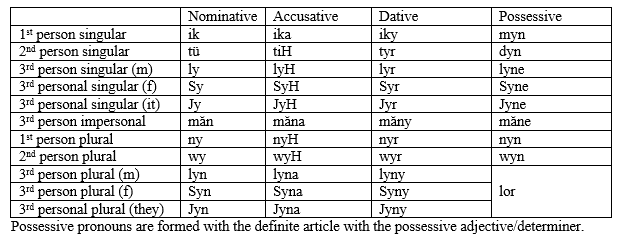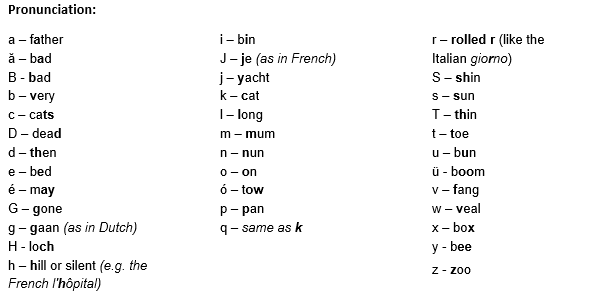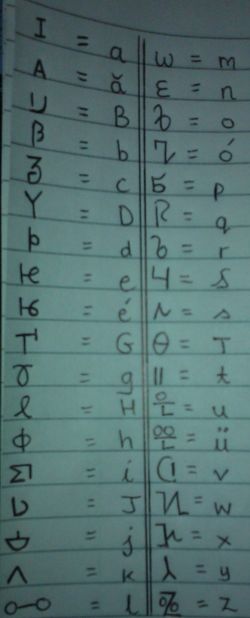Myrotanian language
| The Myrotanian Language De myrótanyesce spraH | |
|---|---|
| Date of creation | 28 June 2014 |
| Creator | Thomas I, Emperor of Myrotania |
| Language family | Based on Germanic |
| Writing system | Case-sentence Latin; Myrotanian (uncommon) |
| Sources | 56.5% Germanic origin 29.4% Italic origin 10.6% A priori origin 0.6% Hellenic origin 0.4% Balto-Slavic origin |
| Official language in | Myrotania |
| Regulated by | The Emperor, Thomas I |
The Myrotanian Language, or simply Myrotanian, is a Germanic-based constructed language (conlang) created by the Emperor Thomas I near the end of June 2014 for official and academic use within the Empire of Myrotania and the language was originally intended to be based upon the Dutch language.
Capitalisation
In Myrotanian, words are not capitalised as certain letters have different pronunciations when capitalised (e.g. 'h' may be silent, whereas 'H' is always pronounced and is similar to ich in German).
Etymological Sources
There are, overall, 483 root words in the Myrotanian language. The etymological breakdown goes as follows:
- Dutch: 32.92%
- German: 20.29%
- French: 10.77%
- A priori: 10.56%
- Italian: 9.32%
- Latin: 6.63%
- English: 3.31%
- Spanish: 2.28%
- Esperanto, Greek and Korean together: 1.66%
- Arabic, Latvian, Mandarin, Oscan, Romanian and Russian together: 1.24%
- Roots from other Myrotanian words make up 1.04%
Sentence order
Adjectives
Adjectives precede the noun in Myrotanian. Adjectives in the predicative aren't altered, however, when directly before a noun they are affected in the following way: 
Nouns
Pluralising nouns:
- add -en (or –n if noun ends in vowel)
Declining nouns:
- Accusative: -a (comes after the plural indicator)
- Dative: -y (comes after the plural indicator)
Personal Pronouns
Verbs
Conjugation
The present active indicative conjugation of verbs in Myrotanian is the stem, with the following endings:
- 1st person singular: -e
- 2nd person singular: -es (or -s)
- 3rd person singular: -et (or -t)
- 1st person plural: -em
- 2nd person plural: -eT
- 3rd person plural: -en
Strong vs Weak verbs
Weak verbs are verbs that follow the conjugation patterns (i.e. they're regular). Strong verbs are verbs that do not follow the conjugation pattern exactly. Around three-quarters of the strong verbs in Myrotanian can be classed into 11 different groups of conjugation specific to their ending. The other quarter are irregular and need to be learned.
Pronunciation
Sample texts
The Lord's Prayer
Myrotanian
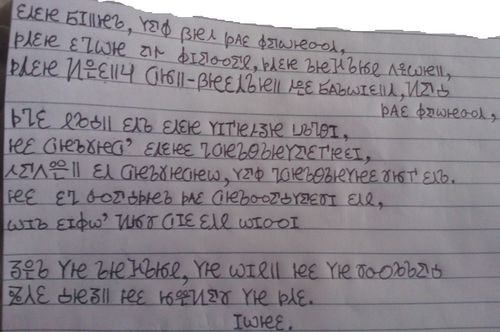
nyne pater, Díh bes dăn himely,
dyne nóme iz haíliH, dyne rexréH kumet.
dyne wuntS vét-benyret sun părmanty, wíj dăn himely.
dón' Hojt nyr nyne DaGesce BróTa,
en vergev' nynen óverTreDinGena,
síküt ny vergevem, Díh óverTreDen géG nyr.
en nó lijder dăn verlijDinga nyH,
mar nahm' wég van nyH mala.
cur De rexréH, De maHt en De glorij,
zyn ject en éüwig De dyn.
Amen
English (literal)
Our Father, who are in Heaven,
Your name is holy, Your kingdom come.
Your wish done-become on Earth, like in Heaven.
Give today to us our daily bread,
And forgive our trespasses,
As we forgive, who trespass against us.
And don't lead into temptation us,
But take away from us evil.
For the kingdom, the power and the glory,
Are now and eternally yours.
Amen
Article 1 of the UDHR
All human beings are born free and equal in dignity and rights. They are endowed with
reason and conscience and should act towards one another in a spirit of brotherhood.
Myrotanian
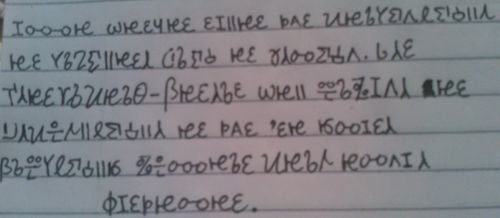
alle menSen naten dăn werDikHijty en Dróiteny vrij en gylijk. Jyn GyenDowerT-benyrn
met ürzaky en BywustHijty en dăn 'ne élany brüDHijté zullern wers elkay handelen.
English (literal)
All humans are born in dignity and rights free and equal. They endowed-become with
cause and conscience and in a sprit of brotherhood should towards each other act.
Written Myrotanian
Case-sensitive Latin
Case-sensitive (Capitonymic) Latin used to write Myrotanian
a ă B b c D d e é G g H h i J j k l m n o ó p q r S s T t u ü v w x y z
is transliterated directly from the Myrotanian Alphabet. Including accents, there are 36 Latin letters used (with an optional 37th, the acute accent over the 'i', to aid pronunciation). This way of writing Myrotanian is the most common, as there is not yet a way of typing the Myrotanian alphabet straight onto a computer.
Myrotanian Alphabet
This is the Myrotanian alphabet in the order:
a ă B b c D d e é G g H h i J j k l m n o ó p q r S s T t u ü v w x y z'
External links
- English - Myrotanian Dictionary
- Myrotanian Etymology per word
- Myrotanian Etymological breakdown
- Myrotanian Grammar and explanations
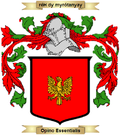 Empire of Myrotania |
Government
The Law of Myrotania • Monarchy • Foreign relations
Thomas I • History • Religion • Language • Alphabet • Politics  |
|---|

